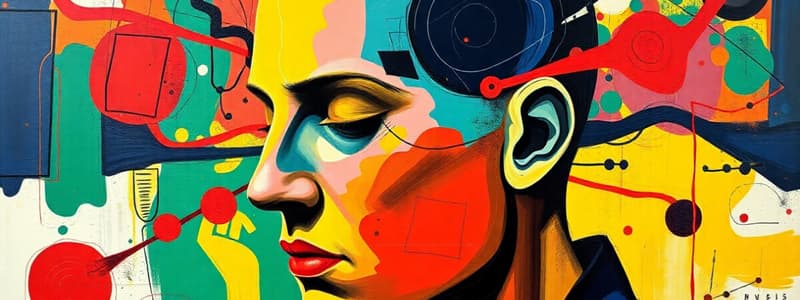Podcast
Questions and Answers
What does the behavioral component of emotion encompass?
What does the behavioral component of emotion encompass?
- Immediate outward expressions in response to emotions (correct)
- Voluntary actions that are socially accepted
- Cognitive interpretations of feelings
- Long-term emotional changes
Which of the following is not considered a universal emotion according to universal emotion theory?
Which of the following is not considered a universal emotion according to universal emotion theory?
- Anger
- Loneliness (correct)
- Surprise
- Happiness
How does empathy serve as an adaptive function in social interactions?
How does empathy serve as an adaptive function in social interactions?
- It allows for emotional connection with others (correct)
- It reduces emotional expression
- It functions independently of emotions
- It fosters emotional detachment
According to the James-Lange theory, how are emotions generated?
According to the James-Lange theory, how are emotions generated?
What is a key characteristic of the Cannon-Bard theory of emotion?
What is a key characteristic of the Cannon-Bard theory of emotion?
In Paul Ekman's experiments, what was the outcome regarding facial expressions?
In Paul Ekman's experiments, what was the outcome regarding facial expressions?
What role do emotions play in encouraging social behavior?
What role do emotions play in encouraging social behavior?
Which component of emotion is associated with physiological changes like heart rate and sweating?
Which component of emotion is associated with physiological changes like heart rate and sweating?
What do drives, such as hunger, primarily prompt organisms to do?
What do drives, such as hunger, primarily prompt organisms to do?
Which theory suggests that behavior is motivated by the expectation of achieving a desired outcome?
Which theory suggests that behavior is motivated by the expectation of achieving a desired outcome?
In the context of intrinsic motivation, what primarily drives an individual's behavior?
In the context of intrinsic motivation, what primarily drives an individual's behavior?
What does the incentive theory of motivation emphasize?
What does the incentive theory of motivation emphasize?
What does the concept of 'valence' in expectancy theory refer to?
What does the concept of 'valence' in expectancy theory refer to?
Which of the following best describes intrinsic motivation?
Which of the following best describes intrinsic motivation?
What is the definition of an instinct?
What is the definition of an instinct?
How does Maslow's hierarchy of needs influence motivation?
How does Maslow's hierarchy of needs influence motivation?
What component of emotion involves thoughts and evaluations related to the emotional experience?
What component of emotion involves thoughts and evaluations related to the emotional experience?
Which statement accurately describes a drive?
Which statement accurately describes a drive?
What does the Yerkes-Dodson law illustrate about arousal and performance?
What does the Yerkes-Dodson law illustrate about arousal and performance?
The drive reduction theory is primarily focused on restoring what?
The drive reduction theory is primarily focused on restoring what?
Which psychological need relates to the desire for social relationships?
Which psychological need relates to the desire for social relationships?
How are instincts characterized in terms of complexity?
How are instincts characterized in terms of complexity?
Which of the following is an example of a biological need that creates a drive?
Which of the following is an example of a biological need that creates a drive?
What is the primary motivation behind the need for achievement?
What is the primary motivation behind the need for achievement?
What are the two factors that produce emotions according to the Schachter-Singer theory?
What are the two factors that produce emotions according to the Schachter-Singer theory?
Which of the following emotions is NOT typically associated with the amygdala?
Which of the following emotions is NOT typically associated with the amygdala?
What does the hypothalamus control that contributes to the physiological aspects of emotions?
What does the hypothalamus control that contributes to the physiological aspects of emotions?
How does the Schachter-Singer theory address a limitation of the James-Lange theory?
How does the Schachter-Singer theory address a limitation of the James-Lange theory?
What role does the amygdala play in the experience of emotion?
What role does the amygdala play in the experience of emotion?
Which theory contrasts with the Schachter-Singer theory but focuses solely on physiological responses first to elicit emotions?
Which theory contrasts with the Schachter-Singer theory but focuses solely on physiological responses first to elicit emotions?
What is a primary function of the limbic system in relation to emotions?
What is a primary function of the limbic system in relation to emotions?
Which of the following statements about the emotional experience is inaccurate?
Which of the following statements about the emotional experience is inaccurate?
What is the affective component of an attitude?
What is the affective component of an attitude?
How do roles influence attitudes according to social psychology?
How do roles influence attitudes according to social psychology?
What was a key finding of the Stanford prison experiment regarding participants in the role of guard?
What was a key finding of the Stanford prison experiment regarding participants in the role of guard?
What is the behavioral component of an attitude primarily concerned with?
What is the behavioral component of an attitude primarily concerned with?
Which of the following best describes persuasion in the context of attitudes?
Which of the following best describes persuasion in the context of attitudes?
What does the cognitive component of an attitude refer to?
What does the cognitive component of an attitude refer to?
Which factor led to the premature termination of the Stanford prison experiment?
Which factor led to the premature termination of the Stanford prison experiment?
Which component of attitude is likely to lead to direct actions such as voting?
Which component of attitude is likely to lead to direct actions such as voting?
Flashcards are hidden until you start studying
Study Notes
Motivation
- Motivation is the force that pushes individuals towards achieving a goal.
- Instinct: An innate, fixed pattern of behavior not shaped by experience. Example: Sea turtles instinctively move towards the ocean.
- Drive: An internal state prompted by a biological need (e.g., hunger) to restore homeostasis.
- Arousal Theory: Individuals are motivated to maintain an optimal level of arousal.
- Yerkes-Dodson Law: Performance peaks at an optimal level of arousal; too much or too little arousal decreases performance.
- Needs: Psychological needs influence motivation.
- Need for Power: Desire to influence others.
- Need for Affiliation: Desire for positive social interactions.
- Need for Achievement: Desire to improve past performance and achieve goals.
Theories of Motivation
- Drive Reduction Theory: Motivation arises from disrupting homeostasis (physiological balance). It prompts behavior to restore this balance.
- Incentive Theory: Motivation is driven by external rewards or pressures and biological drives (extrinsic motivation) or internal rewards (intrinsic motivation).
- Expectancy Theory: Motivation is based on expected outcomes of behavior.
- Expectancy: Belief in achieving a desired outcome.
- Instrumentality: Belief in control over the desired outcome.
- Valence: Value assigned to the desired outcome.
- Hierarchy of Needs (Maslow): Humans are motivated by a hierarchy of needs, starting with basic survival needs and moving towards self-actualization.
Components of Emotion
- Cognitive: Mental processes associated with emotion (e.g., thoughts, evaluation of the situation).
- Behavioral: Outward expression of emotion, often involuntary (e.g., smiling, gasping).
- Physiological: Body's response to emotion (e.g., increased heart rate, sweating).
Theories of Emotion
- James-Lange Theory: Physiological responses directly cause emotions.
- Cannon-Bard Theory: Physiological arousal and emotion occur simultaneously.
- Schachter-Singer Theory: Physiological arousal followed by its cognitive interpretation leads to emotion.
The Biological Underpinnings of Emotion
- The limbic system is a network of brain areas associated with emotion, memory, and motivation.
- Amygdala: Involved in fear, aggression, and emotional memory formation.
- Hypothalamus: Releases hormones and controls the pituitary gland, influencing the physiological component of emotion by controlling the autonomic nervous system.
Attitudes and Behavior
- Attitude: An individual's evaluation of or inclination towards something (positive, negative, or neutral).
- Attitude Components:
- Affective: Feelings about something (e.g., excitement, anger).
- Cognitive: Beliefs and opinions about something.
- Behavioral: Actions towards something.
- Role: Expected behaviors associated with a particular social status.
- Influence of Behavior on Attitudes: Behaviors aligned with social roles can shape one's attitudes.
- Persuasion: Convincing people to change attitudes or behaviors.
Studying That Suits You
Use AI to generate personalized quizzes and flashcards to suit your learning preferences.




